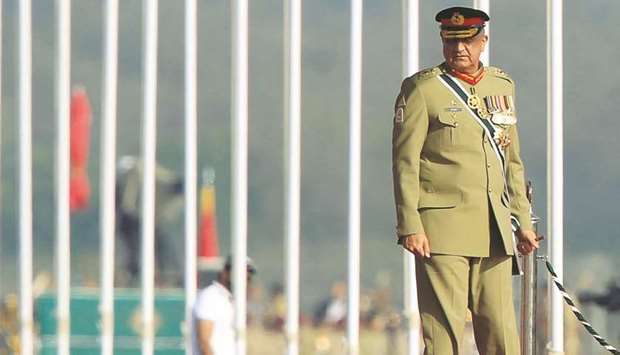Army chief General Qamar Bajwa and head of the Inter-Services Public Relations (ISPR) Lieutenant-General Faiz Hameed had, in a meeting with key opposition figures days before their multiparty conference, counselled them to refrain from dragging the military into political issues, government ministers and opposition leaders disclosed.
The September 16 meeting was attended by about 15 opposition figures, including Leader of the Opposition in the National Assembly Shehbaz Sharif, Pakistan Peoples Party (PPP) chairman Bilawal Bhutto Zardari, Jamaat-e-Islami (JI) leader Sirajul Haq, the Awami National Party (ANP)’s Amir Haider Hoti, the Jamiat Ulema-e-Islam – Fazlur (JUI-F)’s Asad Mahmood, Pakistan Muslim League – Nawaz (PML-N) leaders Khawaja Asif and Ahsan Iqbal, the PPP’s Senator Sherry Rehman, and few government ministers.
According to the ground rules set for the session, the meeting was not to be publicly disclosed, some of the opposition leaders who attended it said.
Railways Minister Sheikh Rashid, while confirming the meeting and its participants in a conversation, said it that was held to discuss the impending changes in the constitutional status of Gilgit-Baltistan (GB).
However, the opposition used this opportunity to flag its concerns about other matters, especially the military’s alleged interference in politics and allegations of persecution of its leaders on the pretext of accountability.
Rashid was one of the ministers who attended the meeting.
The timing of the meeting and its disclosure was linked by observers to the opposition’s multiparty conference on Sunday, in which former prime minister Nawaz Sharif bitterly criticised the army, saying that there was “a state above the state in the country”.
Criticism by other opposition leaders was, in comparison to Sharif’s remarks, relatively subtle.
A 26-point declaration issued at the meeting, however, contained assertions about ending “the establishment’s interference in politics” and “no role of armed forces and intelligence agencies” in future elections.
Rashid said that the army chief clearly told the participants of the meeting that the military was not in any manner linked to the political processes and had no involvement in matters concerning election reforms and accountability.
Bajwa said, however, that the military only responds to calls for assistance by the elected civilian government, and it would continue doing so irrespective of who is in office.
He reportedly categorically conveyed that no one would be allowed to create chaos in the country.
Rashid said that, in remarks addressed to JUI-F chief Fazlur Rehman’s son Asad Mahmood, Bajwa pointed out the irony that the same parliament is “kosher” for Rehman for contesting presidential elections, but it is otherwise unacceptable to him.
The allegations of a political witch hunt in the name of accountability was raised by the PML-N’s Ahsan Iqbal.
Responding to him, the army chief said that the National Accountability Bureau (NAB) chief and election commissioner were picked by political leaders represented in parliament, therefore they needed to be careful in choosing people for such important positions.
A participant, speaking on condition of anonymity said that the NAB’s actions had “scared” the bureaucracy, which is the reason why officials are not taking crucial decisions.
Bajwa too had purportedly pointed out that bureaucracy “was not delivering”.
The PML-N remained mum about the participation of its leaders in the meeting.
The PPP said it would issue a formal comment on the meeting through its spokesperson Senator Farhatullah Babar.
However, Senator Sherry Rehman, participating in a TV talk show, said that her party’s chairman talked about the status of Gilgit-Baltistan and its upcoming elections.
She said that PPP chairman Bilawal stressed on the need for fair and free elections in GB, because of the sensitivities attached to the region.
Rehman denied that her party spoke of its reservations about the accountability process.

General Bajwa: No one would be allowed to create chaos in the country.
